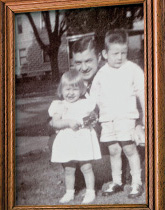The 10-year-old boy walks in step with his dad, savoring a moment when he has his father to himself. They approach Kresge Hall, on the Carnegie Institute of Technology campus in Pittsburgh. They're going to spend a few hours inside this grand old hall, watching a Shakespeare production brought to life on stage. The boy almost instinctively holds his breath as they take their seats in the auditorium—it's resplendent with burnished woodwork, ornate wall murals, and a spectacular stained-glass skylight.

The boy especially appreciates these outings. After all, his dad—a pragmatic, hardworking man who's a project engineer designing rolling mills for steel plants by day and is earning a mechanical engineering degree from the Carnegie Institute at night—isn't available much to young Ray. Raymond Lane Sr. comes home after work, eats dinner with his family, and goes upstairs to study until bedtime. Even at that, it takes the elder Lane nearly seven years to earn his degree. This kind of work ethic and value of education aren't lost on his son, who grows up to earn a mathematics degree at West Virginia University.
The start of his career, though, is put on hold because he is drafted into the army, where he serves a two-year stint based in Fort Riley, Kan. There, he is in charge of logistics and supply computing. "In what seems the scariest time in my life, during the Vietnam War, I learned how to program and manage computers," he recalls.
The army experience paves the way for his first job with computing pioneer IBM in the 1970s. He goes on to work for Electronic Data Systems and consulting giant Booz Allen Hamilton in the 1980s. In 1992, he moves to the West Coast to lead Oracle, the second-largest software company in the world, as its president and chief operating officer. During his eight-year tenure, Oracle's revenue grows from $1 billion in 1992 to more than $10 billion. Sadly, while he climbs to the top of the corporate ladder, he can't share his triumphs with his father because his dad died from cancer in 1965, before he could even see his son graduate from college.
Given his stature in Silicon Valley, Lane is approached in 1994 to join Carnegie Mellon's Board of Trustees—a somewhat unusual request because he lives in California and isn't an alumnus. Lane appreciates Carnegie Mellon's efforts to seek leadership beyond western Pennsylvania borders. And he knows his dad would be proud. He agrees to join.
Since then, he has become a managing partner of Kleiner Perkins Caufield & Byers, a leading venture capital firm whose portfolio companies employ more than 250,000 people worldwide. For Carnegie Mellon, he has established, with his wife, The Ray and Stephanie Lane Center for Computational Biology (see "Disease under Siege" in the October 2008 issue), along with an endowed chair in mechanical engineering in his father's name. Most recently, he has been chair of the executive committee for the $1 billion Inspire Innovation campaign. Now, he has turned over the reins of the campaign to Edward Frank [see A Frank Discussion] and succeeded David Shapira as chair of the Board of Trustees. (Shapira, a life trustee of the university, will remain a member of the board's executive and compensation committees.)
"To me, Carnegie Mellon is a treasure," says Lane. "As I step into the chairman's role, I don't see a lot of problems that need to be solved. We can focus on the bigger issues—building the endowment, ensuring adequate capital resources, attracting and retaining star faculty, keeping Carnegie Mellon's research program relevant to society's most pressing concerns, and working on the university's international presence."
It's a big agenda to be sure, but, just like his dad, Lane isn't afraid of hard work.
—Elizabeth May



